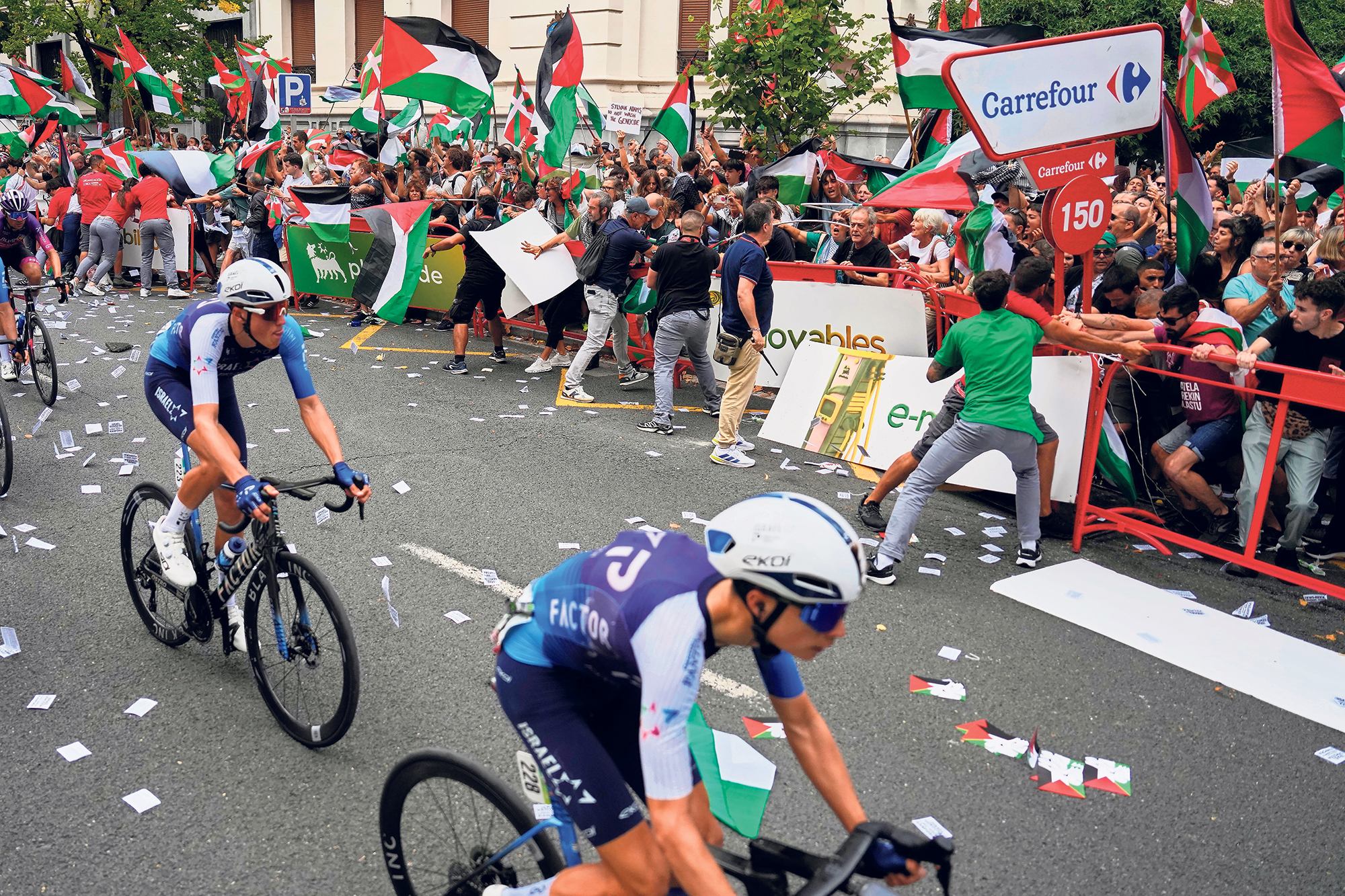The cycling season ends much as it began, with Tadej Pogačar raising his arms in victory, nation-state sponsors dominating and a world governing body showing more interest in social media algorithms than in ethics.
The combination of nation-state investment, ambivalence over anti-doping and stasis over the presence of Israeli athletes and sponsors in the peloton, has plunged the European scene into its biggest crisis of confidence since the Festina doping affair of 1998.
It is unthinkable that the “free festival” of European road racing could have found itself at the mercy of decisions made by Donald Trump, Benjamin Netanyahu and Hamas, but the implications of the pro-Palestine protests at last month’s Vuelta a España finale in Madrid and the presence of the Israeli-endorsed Israel Premier Tech team (IPT) have made that a reality.
The prospect of further mass disruption to races next year is now increasingly probable, should the conflict in Gaza not be resolved and the IPT team continue to compete.
The recently established Athletes 4 Peace collective has called on Fifa and Uefa to ban Israeli participation, saying that “it is an obligation for sporting bodies to take action against sports teams representing a country which a United Nations commission has concluded is committing genocide”. Cycling’s world governing body, the UCI, and British Cycling were asked about that initiative. The UCI has previously expressed its “total disapproval of and deep concern about the events” of the pro-Palestine protest, while British Cycling declined to comment.
Since the near-collapse of 1998, cycling has survived multiple scandals and worked hard to shed its old-world image and become truly global. That pursuit of globalisation, allied to the chase for new money from territories such as the Middle East and Africa, has come at a price. The recent World Championships in Rwanda, watched by crowds described as enthusiastic, happy and polite, were a long way from the chaos in Madrid and swept the crisis under the carpet, although two of IPT’s main sponsors have now moved to distance themselves from the politicisation of the team.
Instead, the main headlines were made by Pogačar, who took yet another extraordinary solo win in the men’s elite road race. From Tuscany in March to Africa in autumn, the Slovenian has been miles ahead of the rest, while displaying an increasingly dismissive attitude to his peers.
That antipathy has become mutual, as the increasing levels of carping about his dominance suggest. “I’m not here to make enemies,” the Slovenian said in July, when asked if he was in danger of becoming despised. “When I finish my career, I will probably not speak to 99% of the peloton”.
His UAE Emirates team, close to winning the Giro and second overall in the Vuelta, have enjoyed the highest number of victories ever, surpassing the mark of 85 wins in a season set by Mark Cavendish’s Columbia-HTC team in 2009.
Unspoken in the World Tour bubble is the shadow of suspicion that follows such domination. Many choose to ignore it, while others consign it to a hangover from the “bad old days”. The man who finally caught up with Lance Armstrong, Travis Tygart, is not so sure.
Newsletters
Choose the newsletters you want to receive
View more
For information about how The Observer protects your data, read our Privacy Policy
The US Anti-Doping Agency chief told The Observer in May that the fight against doping in sport is “at its lowest point” in 25 years. “There is a lot of apathy in the [anti-doping] system whether in sport, or in Wada [World Anti-Doping Agency], of just shrugging your shoulders,” the American said.
There have been anti-doping gains, although they are mostly marginal. Wada has just moved to ban carbon monoxide rebreathing, a haemoglobin measuring technique used by both Pogačar and Jonas Vingegaard, fellow Tour de France winner, when training at altitude.
Despite that, in the face of Pogacar’s relentlessness, it has been hard for other teams to get a look in. The sight of the Slovenian and two of his UAE team-mates, Isaac del Toro and Juan Ayuso, leaving the peloton behind on the brutal course in Rwanda, summed up the season.
Pogacar won the Tour, while the Visma–Lease a Bike team won both the Giro, through Simon Yates, and the Vuelta, with Vingegaard. But the racing in Spain, in particular, was overshadowed by the protests that shook the sport out of its bubble of self-interest.
Meanwhile, IPT have been told they are not welcome at this weekend’s Giro dell’Emilia in Italy, due to security concerns over the “safety of all athletes, technical staff and spectators”.
As security fears over their presence have increased, IPT have pulled out of a forthcoming series of prestigious one-day races in northern Italy. In play at the moment is a discussion revolving around IPT’s future name, although whether that will be enough to placate the increasingly vociferous mass protests expected at bike races in 2026 remains to be seen.
Adam Hansen, the former professional who is now head of the riders’ union, the CPA, has proposed that races be cancelled and not televised in order to end the pro-Palestine protests. “Protesters should have the platform taken away from them,” Hansen told the BBC. “If they have no platform, they won’t go to a race.”
Referencing the mass protests that disrupted the final stage of the Vuelta, Hansen said: “Cancelling would have shown them there’s no point in coming to bike races because we turned the TV off. Yes, it’s a huge deal...but we have to make a small sacrifice today for the long-term future of cycling.”
Unlike in other sports, such as the NFL, football or cricket, cycling teams have no attachment to any sense of place; their loyalties are solely to their investors. But it’s clear that while naming teams after nation states may have brought new wealth into a sport that has long been financially fragile, it has also brought a new raft of ethical problems.
Photograph by Miguel Oses/AP Photo



